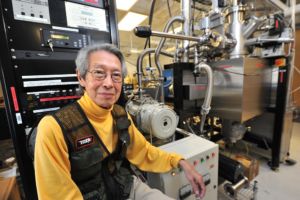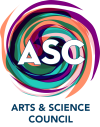A lifelong search for meaning – Dr. Raphael Tsu, ASC Honors

Why this matters: ASC recognizes that creative individuals and teachers enrich the cultural lives of everyone in our region and beyond through their work.
By Michael Solender
As a young boy growing up in Shanghai, China, Raphael “Ray” Tsu would look skyward wondering about the universe beyond the clouds.
“I asked my mother, ‘What is behind the clouds?’” recalled Tsu. “She told me, ‘The sun.’ I’d then ask, ‘What is behind the sun?’ and she told me, ‘The stars.’ When I finally asked, ‘What is behind the stars?’ she told me, ‘Only God knows.’ I knew then at 10 years old there was so much we didn’t know. This is what drives me as a scientist, to learn about what we don’t know.”
Tsu’s long journey from Shanghai to Charlotte is one filled with years of searching for and discovering meaning. Along the way, his valuable contributions to the world of science have created a lasting legacy.
His career as a scientist saw Tsu working at such prestigious organizations as Bell Laboratories, Trinity University, Campinas University, the University of Sao Paulo, the Solar Energy Research Center, North Carolina A & T State University and the Micro Electronic Center of North Carolina.
During his employment with IBM, Tsu’s close working relationship with Nobel Laureate Leo Esaki led to a breakthrough development of man-made superlattice structures. This work pioneered a new era of microelectronic device production and dramatically accelerated advances in nanoscience.
Since 1988, Tsu has served as Distinguished Professor at the University of North Carolina at Charlotte, where he is known as an exemplary scientist and engineer. Tsu’s development and direction of research programs have resulted in more than $8 million of sponsored projects assigned to the university and the Charlotte region.
Tsu is personally credited with advancing the university as a preeminent research institution in the field of science and technology of microelectronic devices. His partnerships with local technology companies, such as Synoptics, have attracted other faculty to the region and enabled the establishment of doctoral programs in engineering and physics.
Tsu is a fellow of the American Physical Society and International Advisory Board of the Microelectronic Journal.
He’s been recognized with numerous awards, including by IBM in 1975 as an Outstanding Contribution award winner, the 1975 Alexander von Humboldt Award and was co-winner of the American Physical Society’s International New Material Prize in 1985.
His vast body of publications includes 200 papers and more than 10,000 citations and references. Tsu finds it gratifying to know his work inspires others and advances the science he’s dedicated his life to.
“All my work is because of collaboration,” said Tsu, who views knowledge sharing as the foundation of scientific discovery. “Scientists need interaction to succeed. Accidents leading to discovery happen only when you are working with others.”

